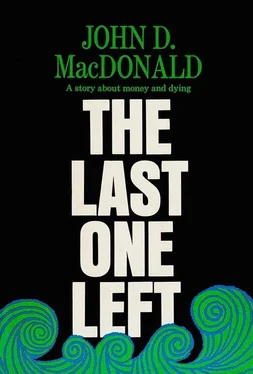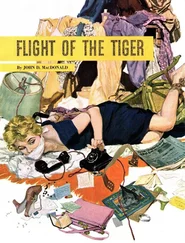Kindler said, “Look, we’re asking you as an ex-employer. That’s all.”
“Then if that’s the relationship, I think you’d better get maybe the man he worked for at that little marina. I just don’t care to be — identified with the whole thing. I’m really sorry.”
“We can’t force you,” Kindler said. “Can I use the phone and find out what they want us to do?”
“Of course.”
Scheff had an idea he knew was at least as good and possibly better than Kindler’s. It could even be the same idea. So he said, “I’ll check in, Bert.”
He dialed Lobwohl’s outside line. After the first four seconds Lobwohl caught on that Scheff was talking for the benefit of someone who could hear his end of the conversation. Scheff reported the Harkinson woman’s refusal and started to ask for instructions and then said, “What? No kidding! You know, that’s a funny thing because that’s just what this Mrs. Harkinson was saying. She said he wasn’t the type. Yeah. Sure. Well, nobody touched his money there and it wasn’t hard to find, so you can forget that angle. She might have some ideas. What? Well, it’s on account of she knew him real well, right up to a little while before he went to the Bahamas. Yes, that’s what I mean. Yes, that’s what I’d say it was. We can ask her, but if she didn’t want to do the other, why should she do this? I see. Sure. Well, put it this way, she’s a smart lady and I don’t think we’d have to do it that way.”
He hung up and stood up and said, “Somebody tried to make it look like suicide. But the lab boys say he was killed. You were right, Mrs. Harkinson.”
“It’s — easy to understand. But it’s still dreadful.”
“I’m sorry to have to do this to you, Mrs. Harkinson, because I guess if you hadn’t been a little shook you wouldn’t have let us know Staniker and you had a relationship. But we do know it, and we can’t just forget you said it, and I was duty bound to report that.”
“I wish you hadn’t.”
“They say you should come in and they’ll take a statement.”
“But why? ”
“When somebody is murdered and it isn’t robbery, then what we have to do is find out who would want to kill him and why, and the quickest way to get a line on that is to interrogate somebody who knew him real well, would know what his habits were and so on. What I should explain, it’s a little different than the identification thing. You can come along voluntarily, but if you say you won’t, then because you might have some information bearing on a known murder, we’d have to set it up to take you in anyway. You could refuse to answer questions once you’re there, but that would be up to you. What you can do if you want, you can phone your lawyer to meet you there, or go in with you.”
“Are you charging me with anything?”
“No m’am. Not if you come in voluntarily.”
She spread her arms wide, and with rueful grin said, “Why don’t I learn to keep my mouth shut? So you’ve convinced me. Voluntary cooperation. There isn’t a thing I can help you with as far as I know, but I’ll go in. And I certainly don’t need a lawyer. But there’s one errand I’d like to do on the way in. Some material I have to leave off with my dressmaker. Can we do that?”
“Sure can,” said Kindler.
“Excuse me a few minutes while I get it ready. Then we can go.” When she closed her bedroom door behind her, she hurried to the closet in her dressing room, and pulled out the twine-wrapped package of the clothing she had worn. One of her suits had been returned in a white cleaner bag. She wrapped the bundle neatly, tied it with twine, snipped the twine with her nail scissors.
She stood quietly and made herself review every possible thing which might turn up in a painstaking search of the house. After putting the single shell in Olly’s little rifle, and hiding the rifle under the edge of decking where she could grasp it quickly enough, she had dropped the extra shells into the bay as she had sailed the Skatter down to the place where Olly was waiting for her in the dark in his car. The notes and plans had been burned in an ashtray and the ashes flushed down the toilet. He’d taken his other belongings home.
It was strange, she thought. You brace yourself for the police. You wait. You expect them to be narrow deadly people, and poisonously clever. But when they arrive, earlier than you had expected, it is just two placid dumpy apologetic men with mild heavy faces and an air of clumsy courtesy.
The car was delivered as they walked out. She had the man put it in the carport under the servant quarters. He brought her the key and the copy of the service charge. She put them in her purse and as he was unhooking his scooter from the rear bumper, she called to Francisca and told her she would be back in a couple of hours.
Kindler sat in the cage, and she sat up in front beside Scheff. Scheff drove very sedately. She directed him to a large shopping plaza. “It will just be a minute,” she said. “She works daytimes and sews at night. Don’t go away.” She left her white purse on the car seat. She went toward the shops and turned into a long arcade. When she was out of sight she quickened her pace. She went through the arcade and came out behind the buildings. Trucks were parked back there. Garbage cans were lined up behind a supermarket. She looked around. A man rolling a loaded dolly out of a big truck seemed oblivious of her. She plucked the top from a garbage can, dropped the package onto a viscid mass of brown lettuce and rotten fruit, picked up a stick from a shattered crate and pushed the bundle into the garbage and replaced the lid. Flies swarmed like small chars in an updraft, a blue-bellied buzzing audible in the sunlight. She re-entered the arcade.
When they were back on the highway, Scheff said, “That maid of yours a Cuban? Pretty little thing.”
“Francisca is very good natured. But she’s no mental giant. She tries to do what she’s told, but sometimes she doesn’t understand and other times she forgets. I’m losing her, darn it. You get them to where you can trust them to do things the way you want them done, and they take off. There ought to be a way to make them sign up for three years, like the army.”
At two o’clock on Monday afternoon, Sam Boylston sat in his poolside cabana with Raoul Kelly and Francisca. Her manner was constrained, puzzled, apprehensive.
“Promising for Wednesday,” she said. “I keep telling.”
“Miss Torcedo,” Sam said softly.
“Si?”
“Raoul and I must talk. If all your belongings are out there in his car, maybe you have a swim suit. It’s a very nice pool. I think a swim would be relaxing.”
She looked questioningly at Raoul. “Why don’t you, chica? ” he said.
Raoul went out with her to unlock the car. They came back and she changed in Sam’s bathroom. She seemed happier. After she had gone out, with swim cap and towel, Sam said, “She’s a lovely one, friend. Congratulations.”
“You know, you’re very good with her, Sam. She has a good reaction to you. With a stranger she usually goes into her shell. On the way here I told her we can trust you. What was it when we came in? You were okay and then strange for a minute.”
Sam said, “Something that will keep happening to me, I guess. I don’t know how long. When she walked over and sat down — Leila had that same slimness, and she moved the way your girl does, handled her body the same way. And I knew I’d never see Leila again, see her cross a room like that.” He pinched the bridge of his nose, cursed softly. He leaned back. “Take it from the top. God damn it! That sappy kid kills Staniker, then himself. They take her in. What are they trying to get her for? A morals charge?”
Читать дальше






![Джон Макдональд - Wine of the Dreamers [= Planet of the Dreamers]](/books/430039/dzhon-makdonald-wine-of-the-dreamers-planet-of-thumb.webp)




![Джон Макдональд - The Hunted [Short Story]](/books/433679/dzhon-makdonald-the-hunted-short-story-thumb.webp)
